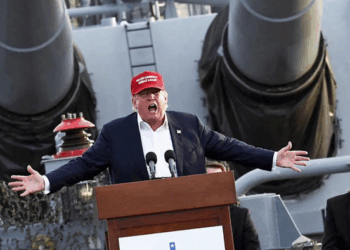Once again Donald Trump has proven himself light-years ahead of Europe in foreseeing major security issues and deep flaws in EU policy.
It was of course all the way back in President Trump’s first term that he first signed the May 2019 executive order seeking to block Chinese telecommunications companies like Huawei from selling equipment in the US, as tech comms by “a foreign adversary” could likely to create an “undue risk of sabotage” or else “catastrophic effects” to US infrastructure, particularly related to sensitive communications systems.
Now, well over a half-decade later and European Union is weighing the possibility of mandating that all member states prohibit the use of Huawei and ZTE equipment in their telecommunications networks. Bloomberg and Reuters are reporting the possible move based on unnamed sources Monday and Tuesday.
And not just that but the new policy would actually have teeth behind it as the EU’s current recommendations would become binding regulations. Member states that fail to comply could face sanctions, which clearly reflects much-belated growing concerns about national security risks linked to Chinese technology companies.
Again, this is something Trump has warned about all along, which earlier was met with a collective shrug in Brussels. Back in 2019 while on a state visit to European countries he had proclaimed, “I do think it’s a security risk, it’s a security danger.”
But like on a number of other issues, such as importation of Russian energy, EU members are not lockstep and on the same page, with outliers like Greece and Spain continuing to rely on Chinese suppliers.
Once again this represents uneven security standards across the bloc, which apparently EU leadership is only very late wising up to when it comes to the threat of Chinese tech embedded within European comms and systems.
Bloomberg writes in a fresh report:
Commission Vice President Henna Virkkunen wants to convert the European Commission’s 2020 recommendation to stop using high-risk vendors in mobile networks into a legal requirement, according to the people, who asked not to be identified because the negotiations are private.
While infrastructure decisions rest with national governments, Virkkunen’s proposal would compel EU countries to align with the commission’s security guidance. If the recommendations become legally binding, member countries that don’t follow the rules could face a so-called infringement procedure and financial penalties.
“The security of our 5G networks is crucial for our economy,” commission spokesperson Thomas Regnier has said this week.
And Bloomberg continues, “Virkkunen is examining ways to limit the use of Chinese equipment suppliers in fixed-line networks, as countries push for the rapid deployment of state-of-the-art fiber cables to expand high-speed internet access.”
Widely viewed by critics as committing intellectual property theft, a violator of trade regulations, and a security risk, Huawei has already been barred from accessing key American technologies and their associated suppliers. Nevertheless, the company managed to release a fairly advanced 5G smartphone in late 2023, and its 5G network equipment continues to hold a strong position in the market.
China’s foreign ministry has reacted to the latest news as follows: “Certain countries’ forced removal of secure and high-quality Chinese telecom equipment has not only delayed their own technological progress but also caused significant economic losses,” according to spokesman Lin Jian. “Politicizing economic and trade issues under the guise of security will hinder technological advancement and economic development.”
Loading recommendations…

















